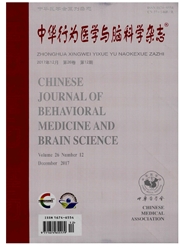

 中文摘要:
中文摘要:
目的探讨N-甲基-D-天冬氨酸受体2B亚基(NR2B)拮抗剂CP-101.606对帕金森病运动并发症大鼠的行为效应及相关信号蛋白的影响。方法将6-羟多巴胺立体定向注射于大鼠前脑内侧束建立帕金森病(PD)动物模型。对模型成功的PD大鼠接受每日2次左旋多巴(每公斤体质量50mg左旋多巴加每公斤体质量12.5mg苄丝肼)腹腔注射,持续22d。在第23天左旋多巴注射前,PD大鼠给予CP-101.606处理。评估旋转反应时间,采用蛋白印迹法检测纹状体区磷酸化NR2B、磷酸化钙调激酶II(CaMKII)及磷酸化谷氨酸受体1(GluRlS831)表达情况。结果NR2B拮抗剂CP-101.606逆转了左旋多巴所诱导的PD大鼠旋转时间的缩短;左旋多巴长期作用后引起磷酸化NR2B及下游相关信号蛋白磷酸化CaMKII与磷酸化GluRlS831升高至(145.3±6.5)%、(132.5±5.7)%及(105.6±6.3)%,而CP.101.606能下调三者磷酸化水平,其表达量分别为(102±4.9)%、(98.4±3.9)%与(49.5±4.2)%。结论NR2B磷酸化可能通过介导N-甲基-D-天冬氨酸(NMDA)受体功能上调并激活其下游相关信号蛋白参与了帕金森病运动并发症的发生,抑制NR2B的药物可能是治疗PD运动并发症的一种新的治疗方式。
 英文摘要:
英文摘要:
Objective To investigate the role of N-methyl-D-aspartate receptor subunit 2B (NR2B) antagonist CP-101. 606 in behaviour and expression of related signal proteins in a rat model of levodopa-induced motor complications. Methods The hemi-parkinsonian rat model was produced by injecting stereotaxically 6-OHDA to right medial forebrain bundle. Then, rats were intraperitoneally treated with levodopa (50 mg/kg with benserazide 12.5 mg/kg, twice daily) for 22 days. On 23th day, rats received CP-101. 606 before levodopa administration. Rotational duration was estimated. After sacrificed, phosphorylated NR2B and Ca^2 +/calmodulin-dependent protein kinase II (CaMKII) and glutamate receptor 1 (GIuR1 S831 ) were observed by western blot. Results The results showed that NR2B antagonist CP-101. 606 reversed the levodopa-induced shortened rotational duration. Chronic levodopa treatment increased abundance of the phosphorylated NR2B and downstream related signal proteins CaMKII and GluR1 S831 to ( 145.3 ± 6.5) % and ( 132.5± 5.7) % and ( 105.6± 6.3 ) % , respectively. Moreover,CP-101. 606 could reduce byperphosphorylation of NR2B and CaMKII and GIuR1S831 to (102 ±4.9)%, (98.4 ±3.9 ) % and (49.5 ± 4.2 ) % , respectively. Conclusions These results indicate that the enhancement of N-methyl-D-aspartate (NMDA) receptor function mediated by NR2B phosphorylation contribute to development of motor complications, through a mechanism that involved the downstream signal mediators of NMDA receptor overactivation. Pharmaceuticals which act to inhibit NR2B may be useful in the treatment of the motor complications in parkinsonian patients.
 同期刊论文项目
同期刊论文项目
 同项目期刊论文
同项目期刊论文
 期刊信息
期刊信息
